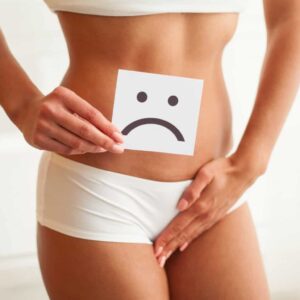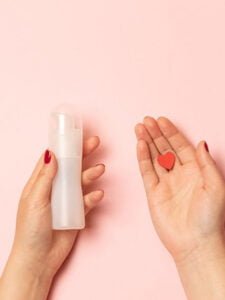Welcome to a candid discussion about a topic that many women experience but few openly discuss – vaginal dryness. Whether due to hormonal changes, certain medications, or other factors, this common condition can affect women of all ages and stages of life. Fortunately, there are effective medications available to alleviate discomfort and enhance intimacy. In this blog, we’ll explore the medication for vaginal dryness, its benefits, and the risks involved.
Contents
Should I Consider Medication for Vaginal Dryness?
 If you’re experiencing symptoms of vaginal dryness such as discomfort, itching, or pain during intercourse, considering medication might be a viable option. Vaginal dryness can result from factors like hormonal changes, menopause, or certain medications, and it can significantly impact your overall well-being and intimate relationships. However, it’s crucial to consult with a healthcare professional.
If you’re experiencing symptoms of vaginal dryness such as discomfort, itching, or pain during intercourse, considering medication might be a viable option. Vaginal dryness can result from factors like hormonal changes, menopause, or certain medications, and it can significantly impact your overall well-being and intimate relationships. However, it’s crucial to consult with a healthcare professional.
They will help to determine the underlying cause of your symptoms and to discuss the most suitable treatment plan based on your health history and individual needs. Open communication with your healthcare provider will guide you in making an informed decision about whether medication is the right path for addressing your vaginal dryness and improving your overall intimate health.
What Are Some Medication For Vaginal Dryness?
Several medications can be used to address vaginal dryness, each with its mechanisms and benefits. It’s important to note that the choice of medication depends on the underlying cause of the dryness and individual health considerations. Always consult with a healthcare professional before starting any new medication. Here are some common medications for vaginal dryness:
Hormone Replacement Therapy (HRT)
Estrogen is a key hormone responsible for maintaining the health and elasticity of vaginal tissues. During menopause, estrogen levels decrease, leading to vaginal dryness. Estrogen therapy, available in various forms such as creams, tablets, and vaginal rings, helps replenish estrogen levels.
This, in turn, improves the moisture content, reduces dryness, and enhances the flexibility of vaginal tissues. It’s important to discuss the risks and benefits of estrogen therapy with your healthcare provider, particularly if you have a history of certain cancers or other health concerns.
Non-Hormonal Prescription Medications
Ospemifene is a medication that acts as a selective estrogen receptor modulator. It helps alleviate pain during sexual intercourse by targeting estrogen receptors in the vaginal tissues, providing benefits without using systemic estrogen. It’s an option for postmenopausal women experiencing pain and dryness during sex. As with any prescription medication, potential side effects and individual health considerations should be discussed with a healthcare professional.
Over-the-counter (OTC) Remedies
- Vaginal Moisturizers: These are non-hormonal, over-the-counter products designed for regular use to maintain vaginal moisture. They typically contain ingredients that mimic the body’s natural lubrication, providing relief from dryness. Vaginal moisturizers are applied directly to the vaginal area and can be used on a regular schedule, usually a few times per week.
- Water-Based Lubricants: While not a long-term solution for vaginal dryness, water-based lubricants are a readily available option for immediate relief during sexual activity. They are applied externally or internally as needed. It’s important to choose a lubricant without added irritants, especially if you have sensitive skin.
Natural and Herbal Alternatives
- Black Cohosh: Black cohosh is an herbal supplement that some women use to alleviate menopausal symptoms, including vaginal dryness. It is believed to have estrogen-like effects, although the evidence on its efficacy is not conclusive. As with any herbal supplement, consult with a healthcare provider before use, especially if you have a history of liver problems.
- Soy Isoflavones: Soy contains compounds known as isoflavones, which have estrogen-like properties. Some women find relief from vaginal dryness by incorporating soy-based products into their diet or through soy isoflavone supplements. However, individual responses can vary, and it’s crucial to discuss these options with a healthcare professional.
Topical Estrogen Creams
- Estrace (Estradiol): Estradiol is a form of estrogen available in a topical cream for vaginal use. It is applied directly to the vaginal tissues, leading to localized estrogen effects. This helps improve moisture, reduce irritation, and promote the overall health of the vaginal lining. Like other forms of estrogen therapy, it’s essential to discuss potential risks and benefits with a healthcare provider.
Remember, the choice of medication depends on individual health factors, the underlying cause of vaginal dryness, and personal preferences. Always consult with a healthcare professional before starting any new medication, and maintain open communication to ensure the chosen treatment aligns with your overall health goals.
Which Lubricant Is Best For Vaginal Dryness?
 There are various lubricants available for addressing vaginal dryness. Water-based lubricants, such as Astroglide and K-Y Jelly, are popular choices as they are easily accessible and compatible with condoms. Silicone-based lubricants like Pjur and Wet Platinum offer longer-lasting lubrication.
There are various lubricants available for addressing vaginal dryness. Water-based lubricants, such as Astroglide and K-Y Jelly, are popular choices as they are easily accessible and compatible with condoms. Silicone-based lubricants like Pjur and Wet Platinum offer longer-lasting lubrication.
Additionally, there are oil-based options like coconut oil, which some women find effective. Personal preferences and any potential sensitivities should guide the choice, and it’s advisable to test a small amount before regular use. If dryness persists or is accompanied by other symptoms, consulting with a healthcare professional for a more tailored solution may be beneficial.
What Are The Benefits Of Medication For Vaginal Dryness?
Medications for vaginal dryness can offer several benefits in addressing discomfort and improving overall well-being:
- Relief from Discomfort: One of the primary benefits of medications for vaginal dryness is the relief from physical discomfort associated with dry and irritated vaginal tissues. HRT and certain prescription medications work to restore moisture, reducing itching, burning sensations, and discomfort.
- Improved Sexual Function: Many women experience a positive impact on their sexual function and satisfaction with the use of medications for vaginal dryness. By enhancing lubrication and promoting vaginal health, these medications can contribute to a more comfortable and enjoyable sexual experience.
- Prevention of Complications: Persistent vaginal dryness can lead to complications such as microtears, increased susceptibility to infections, and discomfort during daily activities.
- Enhanced Emotional Well-Being: Vaginal dryness can have emotional and psychological effects, affecting self-esteem and intimate relationships. Effective medication can alleviate these emotional burdens, promoting a positive mindset and contributing to an improved quality of life.
- Increased Comfort in Daily Activities: Vaginal dryness can extend beyond intimate moments, impacting daily activities such as exercise or even sitting for extended periods. Medications provide a comprehensive approach to address dryness, allowing women to engage comfortably in various aspects of their lives.
It’s important to note that while medications offer these benefits, they may also have considerations and potential risks. Therefore, it’s crucial to consult with a healthcare professional to determine the most suitable treatment based on individual health needs and to ensure a balanced approach to managing vaginal dryness.
What Are The Risks To Consider?
 When considering medication for vaginal dryness, it’s important to be aware of potential risks and side effects. While many women benefit from these medications, individual responses can vary. Here are some general considerations:
When considering medication for vaginal dryness, it’s important to be aware of potential risks and side effects. While many women benefit from these medications, individual responses can vary. Here are some general considerations:
Hormonal Therapy Risks
- Hormone replacement therapy (HRT), which often involves estrogen, may carry risks, particularly in women with a history of certain cancers, blood clots, or liver disease.
- Long-term use of systemic estrogen may have implications for breast health and is associated with a slightly increased risk of certain conditions. Individual risk factors should be thoroughly discussed with a healthcare professional.
Non-Hormonal Prescription Medications
Non-hormonal prescription medications may have side effects, and it’s crucial to be aware of potential interactions with other medications. Consult with your healthcare provider to ensure compatibility with your overall health profile.
Over-the-counter (OTC) Remedies
Some individuals may be sensitive or allergic to certain ingredients in OTC remedies, leading to irritation. It’s advisable to test a small amount on a less sensitive area before regular use.
Natural and Herbal Alternatives
Herbal supplements, such as black cohosh, can interact with other medications or have side effects. Always inform your healthcare provider about any supplements you are taking.
Topical Estrogen Creams
While topical estrogen creams are localized and generally considered safe, there may be a risk of irritation or an allergic reaction. It’s essential to follow the prescribed dosage and usage instructions.
General Considerations
Any medication, whether prescription or over-the-counter, may have contraindications with other medications you are taking. Always inform your healthcare provider about your complete medical history and current medications.
Monitoring and Follow-Up
Regular follow-up appointments with your healthcare provider are crucial to monitor the effectiveness of the chosen medication and address any emerging concerns or side effects promptly.
Before initiating any medication for vaginal dryness, it’s essential to have an open and thorough discussion with a healthcare professional. They can provide personalized advice based on your health history and help you weigh the potential risks against the benefits.
Conclusion
In conclusion, addressing vaginal dryness through medications offers tangible benefits, such as relief from discomfort, improved sexual function, and enhanced overall well-being. While these medications bring positive outcomes for many women, it’s crucial to be mindful of potential risks and side effects, considering individual health factors. Open communication with a healthcare professional is key, as it allows for a personalized treatment plan that aligns with specific needs and minimizes potential concerns.
By navigating the choices carefully and staying connected with healthcare providers, women can find effective solutions to manage vaginal dryness, fostering a more comfortable and fulfilling intimate health journey. If you are facing menopause-related issues, menopause treatment at HerMantra can help. Book your free trial online menopause treatment session now.


